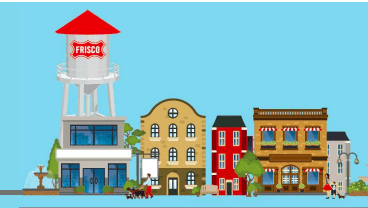Voters in fast-growing Frisco—which has racked up one of the highest amounts of tax-supported debt of any city in Texas and consistently raises homeowners’ property tax bills year after year—will decide if the city can add to its billion-dollar debt and hike residents’ property taxes to pay for it.
Frisco City Council approved placing five debt proposals totaling $345 million on the city’s May ballot. The debt would have to be repaid with property taxes.
A “citizen bond committee” appointed by city council made spending recommendations on January 15, which council approved on February 5:
- Proposition A: $62,500,000 for public safety facilities, equipment and warning sirens
- Proposition B: $155,000,000 for street and road improvements
- Proposition C: $12,000,000 for improvements and addition to the public works facility, including equipment and technology
- Proposition D: $62,000,000 for improving, expanding, and equipping an existing city building for a library
- Proposition E: $53,500,000 for park and recreational facilities
Suggested projects in each category of spending are outlined in a bond committee presentation. Few specifics are included, leaving voters to wonder exactly how, and how efficiently, the money would be spent once approved. The extravagant library project in particular has raised questions among residents about the “master plan” parameters and proposed use of space within the new building.
Frisco’s tax-supported debt has risen steadily in the past five years and was the eighth highest of any city in Texas in 2017, according to the Texas comptroller’s website. Frisco currently owes $1.04 billion in bond debt principal and interest. All of the borrowed money and interest must be repaid by Frisco’s already over-burdened property taxpayers.
City residents’ tax bills have been rising along with the city’s debt. From 2013 to 2016, the average Frisco homeowner’s city property tax bill increased 31 percent to $1,679. The city lowered its tax rate slightly in the past few years, but not enough to offset skyrocketing property values. The current rate is $0.4466 per $100 of assessed taxable value.
The new debt would require even higher property taxes. The proposal forecasts up to a 2.5-cent increase in the tax rate during the six-year bond plan, on top of 5 percent annual growth in taxable property values and population. A higher rate on top of higher values guarantees ever-increasing property tax bills for Frisco homeowners.
In 2015, Frisco voters approved a $267.8 million debt package that included $41.5 million for public safety, $125 million for roads, and $32 million for parks and recreation. The city’s 2006 bond package totaled $198 million in debt principal.
Just a fraction of Frisco voters participated in past bond elections. Turnout was less than 6 percent in May 2015 and less than 3 percent in May 2006.
In addition to the debt propositions, two Frisco City Council races are on the May ballot. Incumbent Shona Huffman faces challengers Jeanne Weisz and Mukesh Parma for Place 2. Incumbent Bill Woodard and Stephanie Cleveland are vying for Place 4.
Frisco voters will also have 24 charter amendments on their ballots.
Texas property taxpayers are taking a beating due to runaway government spending and debt. Average property taxes in the DFW metroplex rose 8 percent last year—well above the national average of 3 percent. Yet instead of offering over-burdened taxpayers much-needed relief, Frisco is joining other local taxing entities in asking for higher property tax bills to pay for more spending and debt. The choice is now up to voters.
Early voting in the May 4 election begins Monday, April 22.





